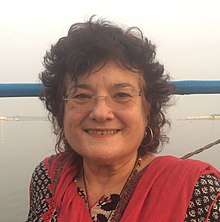
Yvette Rosser (born 31 January, 1952), also known as Ram Rani, is an American writer and scholar. She identifies as a Hindu and teaches Hinduism to Westerners.
Quotes
- When I make presentations about India at teachers' conferences or in classrooms, the two most often asked questions are: "Why do women wear a 'dot' on their foreheads?" and "Why, when there is so much poverty in India, don't they eat all those cows?" These questions broach issues of relevance and correlating non-Western practices to similar experiences in the students' lives, within a context they can comprehend.
- Rosser, Yvette C. (Winter 2001). "The Clandestine Curriculum: The Temple of Doom in the Classroom". Education About Asia (Association of Asian Studies) 6 (3).
- Proposals to include Sanskrit in the course offerings were rejected numerous times by scholars who wanted to protect JNU from what they considered to be a majoritarian or Hindu Nationalist agenda. When I questioned Romila Thapar, a well known historian from JNU, about this issue in July 2000, she explained that if students want to learn Sanskrit, “there are so many Maths and Piths around where they can go”. She added that “most of the regional colleges have some kind of Sanskrit program”.
- Rosser, Yvette Claire (2003). Curriculum as Destiny: Forging National Identity in India, Pakistan, and Bangladesh (Dissertation). University of Texas at Austin.
- Bangladesh is a majority Muslim country, with a significant, if shrinking Hindu minority—about 25-30% at the time of Partition in 1947, and less than 9% in 2003. The textbooks in Bangladesh are not based on an anti-Indian bias as are state sponsored textbooks in Pakistan. The social studies curriculum in Pakistan is premised on creating a national identity that is distinct from India, whereas Bangladeshi textbooks reflect a more pan-South Asian perspective, though Bengal-centric.
- Rosser, Yvette Claire (2003). Curriculum as Destiny: Forging National Identity in India, Pakistan, and Bangladesh (Dissertation). University of Texas at Austin.
External links
This article is issued from
Wikiquote.
The text is licensed under Creative
Commons - Attribution - Sharealike.
Additional terms may apply for the media files.